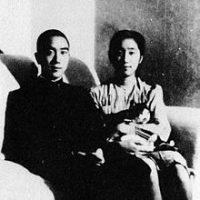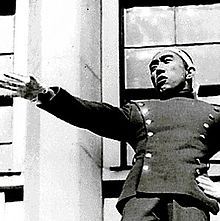Yukio Mishima and the spirit of a genius based on the soul of history: The last great Japanese writer
Lee Jay Walker
Modern Tokyo Times

Japan witnessed many shifting sands since the Meiji Restoration of 1868 based on modernity, liberalism, nationalism, Westernization, reaching out to the past, forging a new future, and other convulsions that ultimately led to a brutal war. In other words, the paths were often contradictory and clashed not only on the political front but also within the soul. Of course, the events of World War Two altered the image of Japan internationally and ultimately enabled America to creep into the psyche of this nation – for good and bad. Hence, the genius of Yukio Mishima is that his books – and thinking – fused the complexities facing individuals in this new world of opportunity – and in the new world of forgetting the past that irked this amazing writer.
In Sun and Steel, Mishima writes, “Was I ignorant, then, when I was seventeen? I think not. I knew everything. A quarter-century’s experience of life since then has added nothing to what I knew. The one difference is that at seventeen I had no ‘realism’.”
If we take these words out of context but relate them to certain ideas held by Mishima, then these worlds can equally equate to the changing landscape of Japan based on skyscrapers and the dilution of faith and philosophy. In other words, maybe Japan had learned everything under the Meiji Restoration based on the hypocrisy of Western, Catholic, and Islamic empires that utilized fear and control at the drop of a hat. Of course, while Islamization followed the Ottomans and Catholicism followed the Spanish – the British view was that you didn’t have to enslave one hundred percent by destroying indigenous faiths. Instead, the essence of the British Empire was to exploit resources at all costs – while destroying the soul of poor indigenous British nationals based on child labor, the workhouse, and a host of other barbaric realities.

This is the world that modern Japan in the Meiji Era woke up to in the nineteenth century. It was a knowledge that exploitation, power, theft, the adulteration of culture, impinging and enslaving the indigenous through various forms outside of chains, controlling resources, and crushing the psyche of others would ultimately benefit the respective ruling elites of Western, Catholic, and Islamic empires. However, for Japan, the same logic they responded to was to become altered based on the changing shifts of time. Hence, Japan was out of step while the international ruling elites utilized their respective hypocrisy, while still controlling wealth and mindsets by utilizing all the negatives of Christianity and Islam to crush the spirit.
Mishima, fearing the soul of Japan was being lost indefinitely based on aspects of the above and the ravages of modernity in defeating the past – would also turn against “words” in time based on his idea of weakness. It is all these convulsions that Mishima sought to express. This is a far cry from modern and relatively mundane writers including Haruki Murakami, Kenzaburo Oe, Banana Yoshimoto, and others, who could never envisage such a world based on being “typical modern souls.”
Mishima said, “If we value so highly the dignity of life, how can we not also value the dignity of death? No death may be called futile.”

Once more, if we take this out of context but relate it to a psyche that once existed within the body politic of certain Japanese warlords, then Mishima may deem aspects of modern Japan – and modern societies in general – to lack “dignity.” Equally, in the mind of Mishima, many aspects of modernity leads to a “futile” existence based on ignoring the past in relation to culture, society, and history.
Mishima wrote, in The Temple of the Golden Pavilion, “The past does not only draw us back to the past. There are certain memories of the past that have strong steel springs and, when we who live in the present touch them, they are suddenly stretched taut and then they propel us into the future.”
Once more, if these words are taken out of context but relate to ideas held by Mishima, then it appears that the future and past are interwoven providing the past re-emerges. Of course, the degree of the past and its hold on the future is open to interpretation. Yet, in the eyes of Mishima a nation can’t truly be propelled if the past is negated and the new God now becomes modernity, the work ethic without a greater goal, a robotic existence based on national insurance numbers, the usurpation of tax by a self-centered central state, and the destruction of high culture for a quick fix based on trash. Therefore, the final days of Mishima were fused with all the convulsions that he witnessed personally – and based on the history he read – and a changing Japan that he feared would destroy the soul of this nation.

Mishima wrote, “A samurai is a total human being, whereas a man who is completely absorbed in his technical skill has degenerated into a ‘function’, one cog in a machine.”
In a past article, I said, “In Mishima’s short memoir, Sun and Steel, it is clear that his obsession during the last ten years was a fusion of writing and bodybuilding to an extreme. This book was published in 1968 and it reflected the psyche of Mishima in this period of his life. He now fused the pen with physical training and concepts of the new Japan betraying the old and glorified Japan. The book Sun and Steel relates to Mishima throwing away his earlier novel Confessions of a Mask. After all, Mishima was now building up to be a man of strength. In other words, the Nietzsche ubermensch was born within the ego and spirit of Mishima.”
Overall, while parts of the Islamic world are crushing freedom and writers are being butchered by Sunni Islamists in Bangladesh; while in the opposite direction the West is in a self-imposed machinery of narrowness based on the need to follow the politically correct narrative; then Mishima is an individual who is free from not only this world based on his dramatic death but, equally important, this great writer was free during his time on this earth despite all the trappings of modernity that could have crushed his soul. Therefore, in comparison with other contemporary writers in Japan, it is abundantly clear that Mishima is the last great writer who remains unmatched based on his literature and the power of his psyche in the last moments of his life.

Modern Tokyo News is part of the Modern Tokyo Times group
DONATIONS to SUPPORT MODERN TOKYO TIMES – please pay PayPal and DONATE to sawakoart@gmail.com
http://moderntokyotimes.com Modern Tokyo Times – International News and Japan News
http://sawakoart.com – Sawako Utsumi personal website and Modern Tokyo Times artist
https://moderntokyonews.com Modern Tokyo News – Tokyo News and International News
http://global-security-news.com Global Security News – Geopolitics and Terrorism
PLEASE JOIN ON TWITTER
https://twitter.com/MTT_News Modern Tokyo Times
PLEASE JOIN ON FACEBOOK